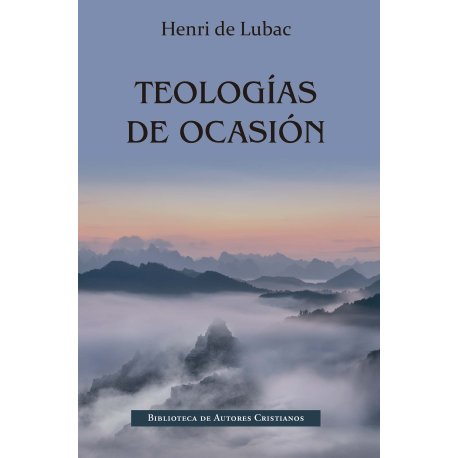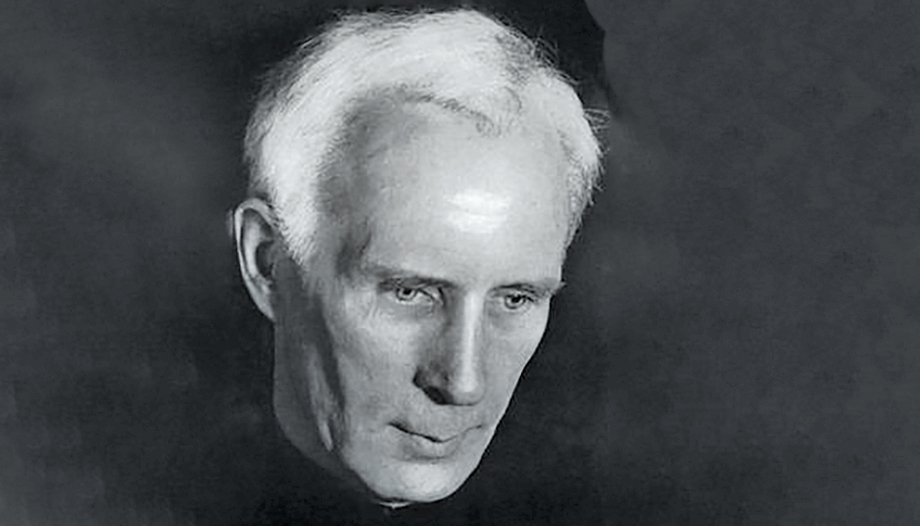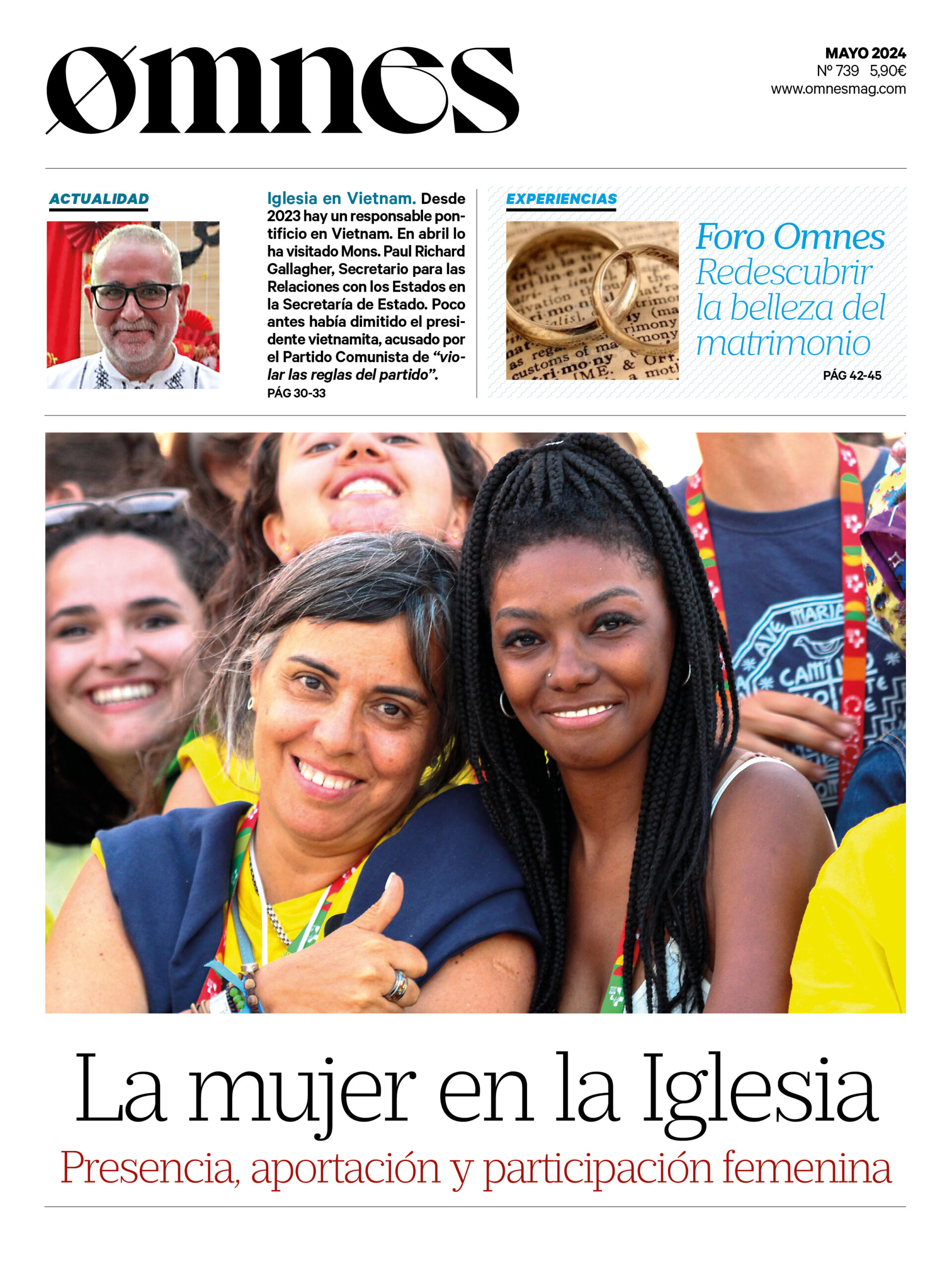Perhaps the first thing that catches the attention of this book Why "theologies of occasion"? The volume recently published by the BAC is composed of twenty-four very uneven works that Henri de Lubac (1896-1991) wrote over almost half a century. In 1984, at the request of his readers, the French Jesuit decided to publish this collection of short writings: "All the texts reproduced here are of theological intent. They come, however, neither from an organic teaching on some central point of dogma or its history, nor from a prolonged research on a particular subject". In another book he also confesses that "the reader has been able to realize that almost everything I have written has been a function of circumstances, often unforeseen, within a certain dispersion and without technical preparation". As his friend H. U. von Balthasar rightly points out, the extensive production of H. de Lubac is "a work that opens freely in all directions".


Theologies of occasion
The name of H. de Lubac is familiar in the theological world, but for more than one this book can be a good opportunity to have a very complete "cosmovision" of the thought of the French Jesuit. In the theology of H. de Lubac one can sense a lively interest in history and in the social aspects of Christianity. Where history was tragic and hurtful, the young professor from Lyon tried to offer a word of discernment. Thus, many of the events that H. de Lubac had to witness characterized the course of his theological work and this explains the vast variety of his production - in themes and works - a disparity that is also reflected in this book. For this reason, we will try to describe the thematic nuclei of each of the chapters, taking into account the "Lubacan order" of the chapters.
As an approximation, we will only look at the first and last parts of the book "Theologies of Occasion", as both are very representative of the whole content.
The first part, entitled "Theology and Spirituality," consists of six chapters of a theological and spiritual nature. Three of them deal directly with questions of an ecclesiological and sacramental nature, two others deal with spiritual theology and the last one is a valuable contribution to the work of fundamental theology:
"Sanctorum communio. In the first chapter, de Lubac examines the meaning that the expression "communion of the saints" has acquired in the Christian tradition over the centuries. The French Jesuit analyzes the vicissitudes of the expression "mystical body" and its repercussions on the relationship between the Church and the Eucharist. For the author, the "communion of saints" means, above all, that among all those who belong to Christ, among all the members of his body, there is a communion of life, which is what builds up and sustains the Church.
Theologies of occasion can help us to answer some of the spiritual questions of our time.
"Mysticism and Mystery." De Lubac's interest in mysticism became a source of inspiration from which to discern many other theological questions. Since it is not the fruit of ignorance, but of adoration, in Christian mysticism "silence is not at the beginning, but at the end". Unlike other possible paths, Christian mysticism is a mysticism of likeness, which looks towards the God who calls man from his deepest nature to orient him towards himself: "God is not ineffable in the sense that he is unintelligible: he is ineffable because he always remains above all that can be said about him".
"Christian Community and Sacramental Communion." Similar to the first chapter, he presents the history of the understanding of the notion of communio-κοινωνία in relation to the Church, but, in this article, H. de Lubac tries to get out of the way of those who feared that the recovery of the biblical and patristic sense of the notion would imply a lowering of the affirmation of the real presence of Christ in the sacrament. With this work, H. de Lubac invites the Christian to immerse himself again and again "in the sacramental origins of the Christian community, in the mystical sources of the Church".
The last part, "In memoriam", contains two articles that refer to "thanking" his great friends and teachers for all that he had received. Those entitled "Philosopher and Apostle" and "The Love of Jesus Christ" are dedicated to the memory of A. Valensin, his philosophy professor at the Catholic Faculties of Lyon. Auguste Valensin (1879-1953) was one of the actors involved in the debates of the Catholic intellectual world between the wars in the wake of the modernist crisis. Undoubtedly, it was Valensin himself who introduced the young Lubac to the thought of M. Blondel. Another common front that further strengthened their friendship was their opposition to totalitarianism. A good part of their epistolary correspondence was published posthumously by H. de Lubac himself, at the request of his superiors.
The last three articles of this last part are dedicated to the outstanding French writer and diplomat P. Claudel: "On a Creed of Claudel", "Claudel theologian" and "The drama of the call". After his religious conversion, which took place on December 25, 1886, during the vespers of Notre-Dame de Paris, Claudel developed a prolific literary work, to the point of being considered one of the main poets and playwrights of the 20th century in the Catholic sphere.
H. de Lubac had begun to read his works since his secondary studies. In fact, P. Claudel will be, along with Ch. Péguy, one of the poets of H. de Lubac's bedside as soon as he enters the Society of Jesus. Claudel and Péguy: two theologian poets, of exceptional stature, too much forgotten in the Church. From their first meeting in 1942, H. de Lubac and P. Claudel shared a mutual interest in the spiritual dimension of the interpretation of the Bible, based on the reading of the Fathers of the Church.
Perhaps the best way to situate the text entitled "On a Claudelian Creed" is to look back to his Memoir, where he explains: "In the prologue that I once placed before a selection of Claudelian texts on the Creed, I tried to show, on the basis of rare examples taken from this selection, what riches Claudel's work offers for doctrinal reflection, what perspectives, sometimes unsuspected [...]. It will astonish by the audacity and the living force of renewal it inspires".
The chapter entitled "Claudel theologian" contains the text of a lecture delivered at the Institut Catholique de Paris in December 1968. The pessimistic aftertaste of some of his notes is perhaps due more to the turmoil and polemics of the immediate post-conciliar period and May 1968 than to the genius of the Lubacian. In fact, his lament does not mourn the eclipse of Claudel, but of the religious and Christian values on which his work was based.
Finally, the article "The Drama of the Call" arose from a review that the Jesuit wrote about a book by A. Becker with the same title. The book tried to highlight the relationship of P. Claudel's work and thought with Christian faith and spirituality, illustrating how the poet had been addressing the theme of the divine call in his lyrical and dramatic work, facing deeply existential and spiritual questions.
At the end of our thematic journey through the twenty-four studies that make up the present volume, we can see the magnitude of this work, built to the rhythm of the work and the days, in a wide range of contexts and occasions in which the French theologian feels challenged to offer a word proper to his work. In this sense, the chapters of "Theologies of Occasion" can help us to answer some of the spiritual questions of our time. Their reading and study will be of great benefit to the reader, to the specialist - and also to the amateur - in theological questions. A reading that is deep and comforting, vital and calm, academic and spiritual. We thank the BAC and the Fundación Maior for their commitment to publish it in Spanish.













